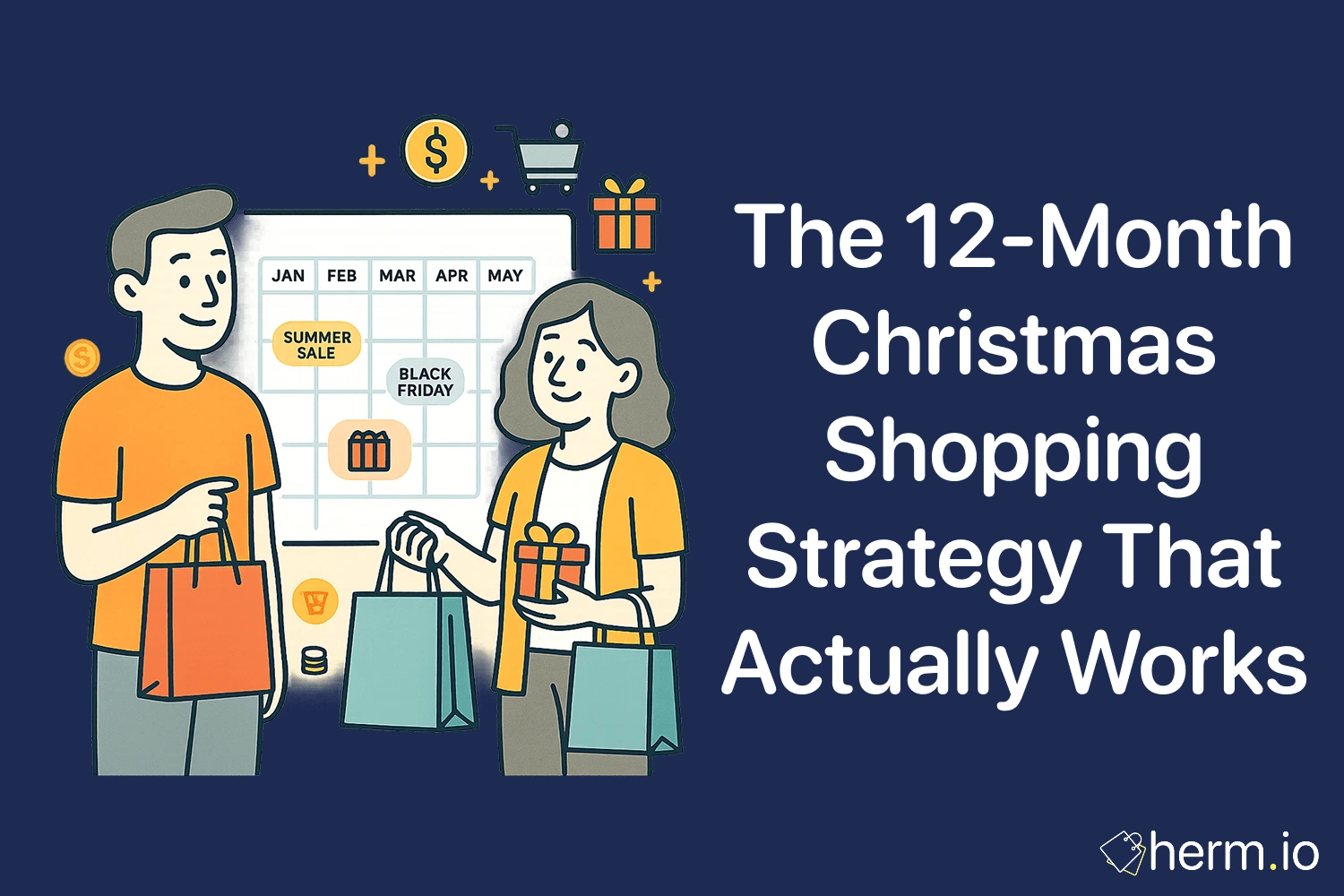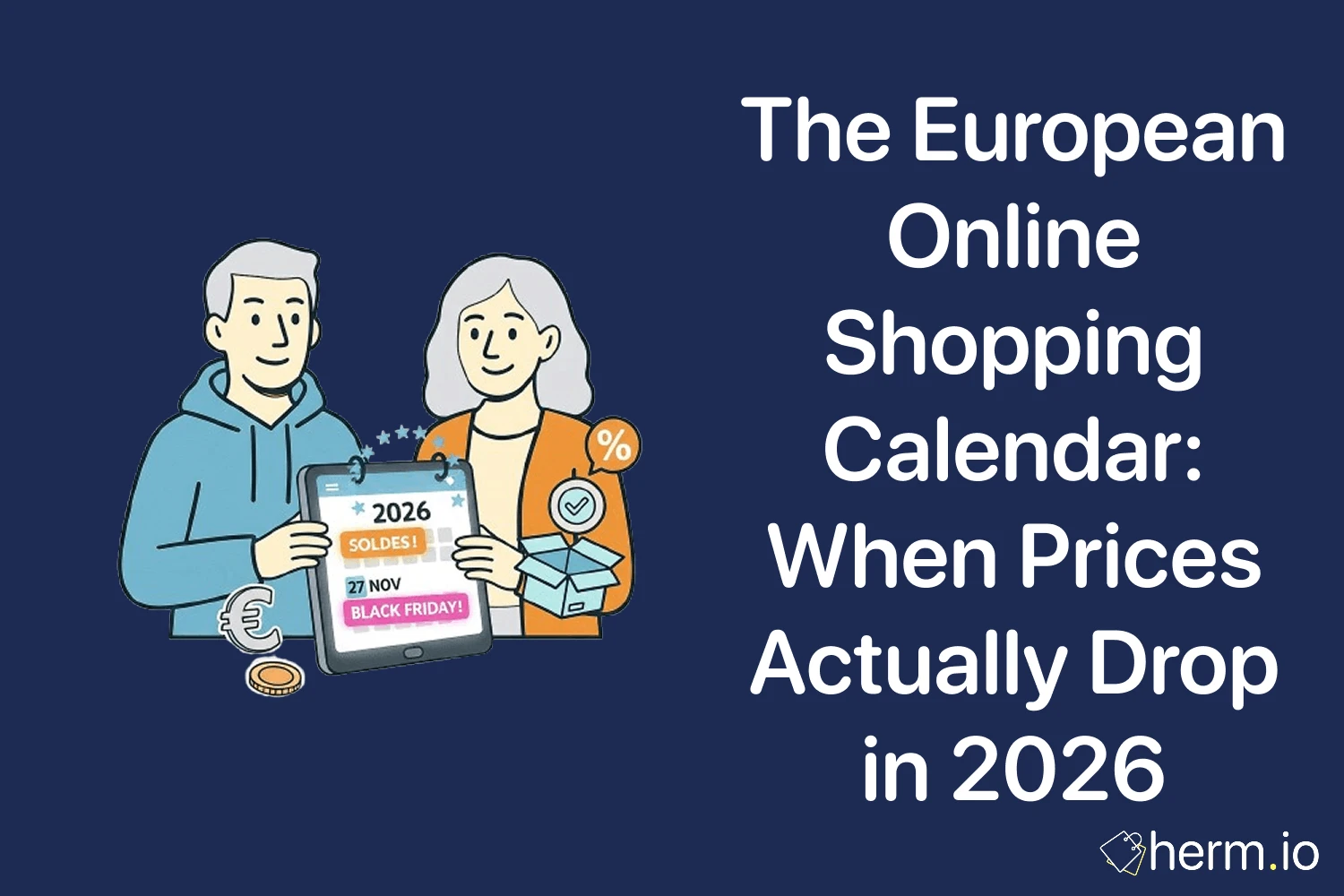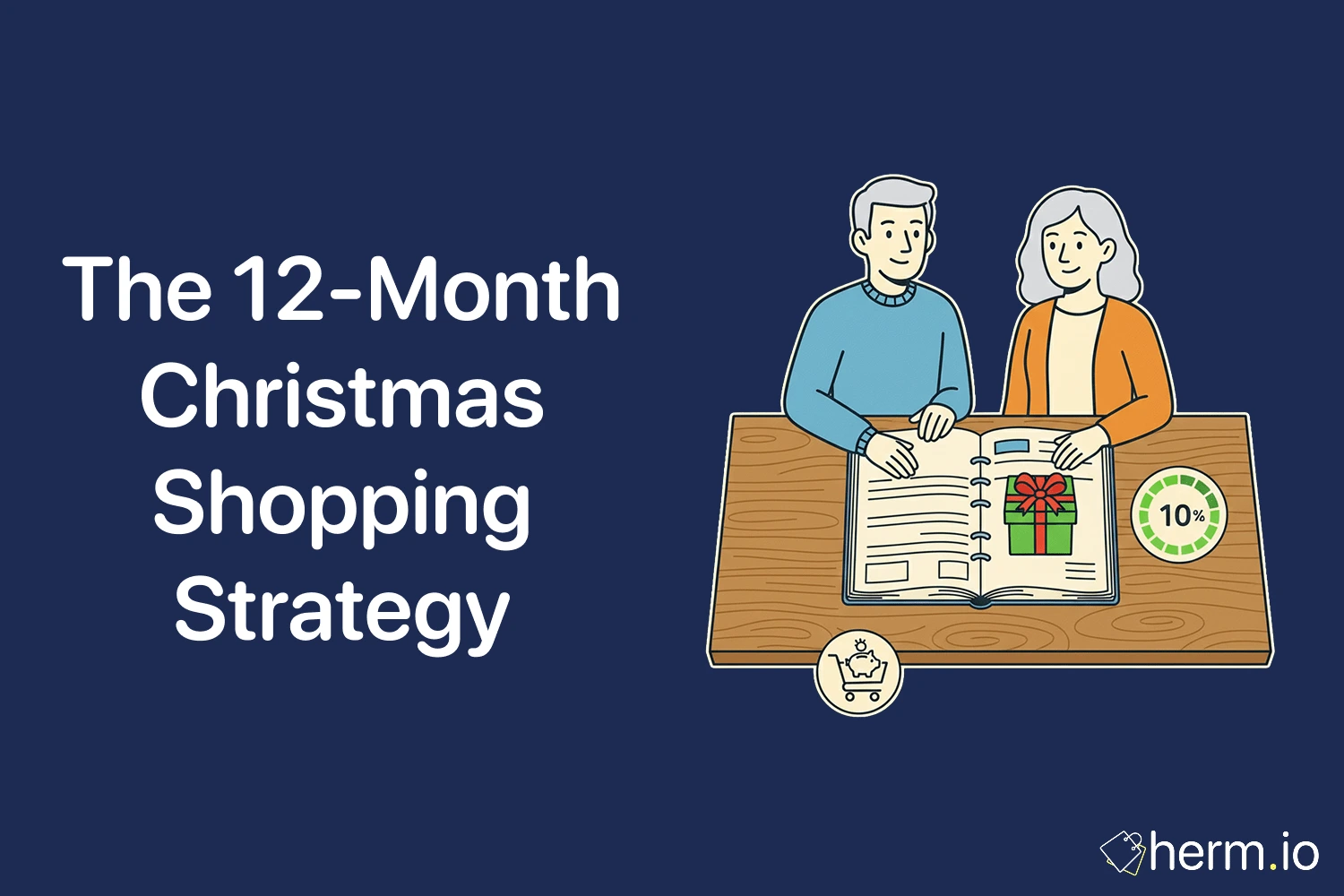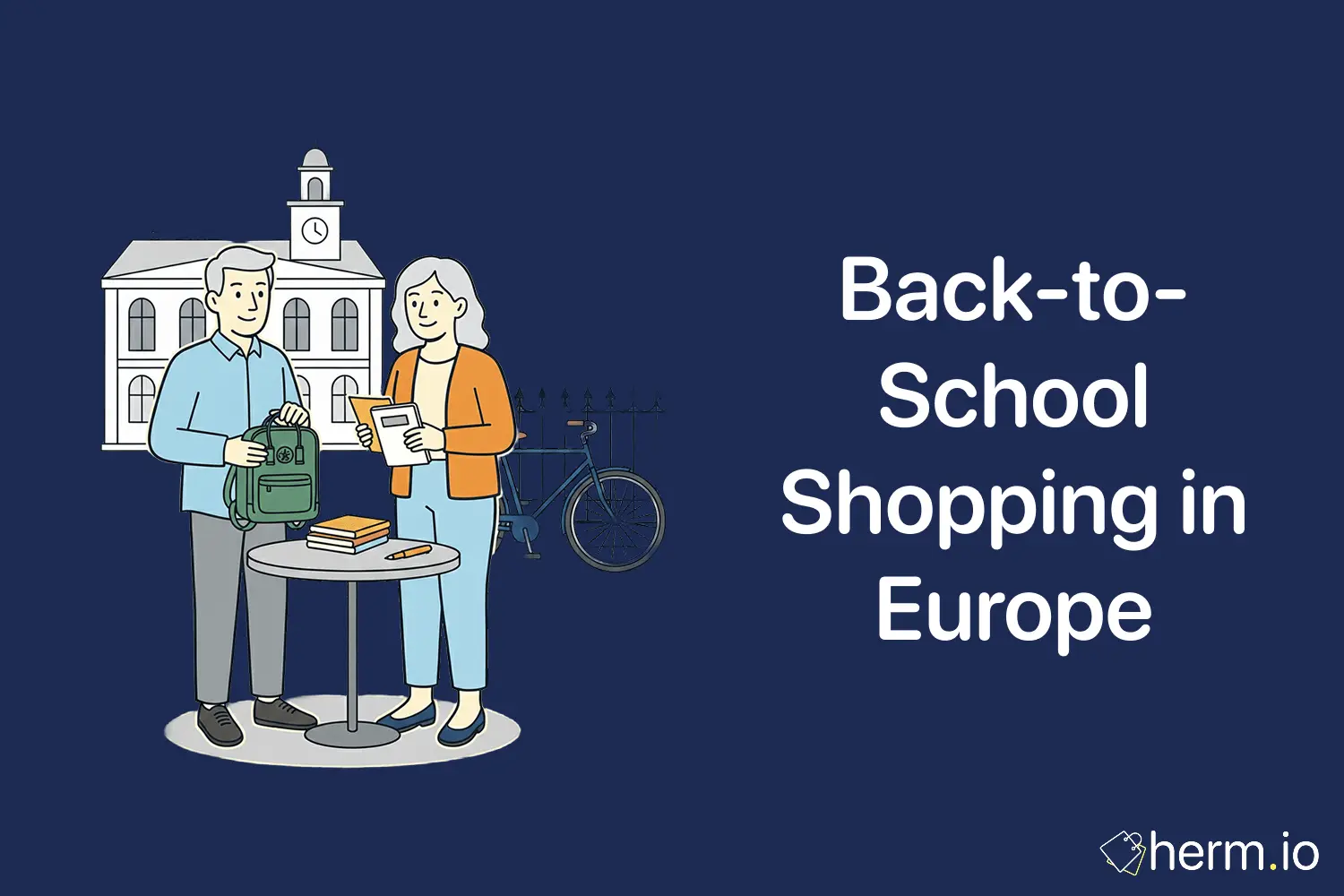
Most Christmas shopping advice tells you to "start early." That's not a strategy; that's stating the obvious. A strategy requires structure, timing, and measurable outcomes. This is the 12-month framework that transforms Christmas shopping from an annual crisis into a series of small, controlled actions.
The result: lower total spend, zero last-minute panic, and December free for what it should be—enjoying the season rather than surviving it.
Quick Wins: Implement These Today
- Open a separate "Gifts" account and automate monthly transfers today—even £50/month becomes £600 by December
- Create a master gift tracker with names, budget allocations, and storage locations to eliminate duplicate purchases
- Set three calendar alerts now: early October for storage review, mid-November for Black Friday prep, early December for final shipping checks
- Designate one storage location for all purchases—unlabelled gifts get lost, costing you time and money
- Save this article and review the month-by-month roadmap at the start of each month for specific actions
The Core System: Why Most "Early Shopping" Fails
Starting early without structure creates three problems: you forget what you've bought, you overbuy when you see sales, and you still panic-purchase in December because you can't find half your gifts.
The solution isn't shopping earlier. It's shopping systematically.
Budget allocation first, purchases second. Determine your total Christmas spend, divide by 12, and automate the transfer. This single action solves cash flow problems and prevents the "I'll make it work" mentality that destroys January finances.
One master tracker, updated immediately. Every purchase logged with recipient, item, location, and receipt link. This takes 90 seconds per purchase and eliminates hours of searching later.
Monthly themes instead of random shopping. January for clearance, September for stocking stuffers, November for big-ticket items. Themes create focus; focus prevents waste.
Month-by-Month Implementation
January: Foundation Month
Post-Christmas clearance offers 60-80% reductions on specific categories. Focus on next year's wrapping supplies, neutral decorations, and winter accessories (scarves, gloves, quality blankets).
Action items:
- Process this year's gift returns within retailer windows
- Purchase 2-3 rolls of neutral wrapping paper, ribbon, and gift tags at clearance prices
- Create or update your master gift list with current sizes, preferences, and no-go items
- Set up automated monthly transfers to your gifts account
February-April: Planning and Early Procurement
These months handle preparation without pressure. Note size changes (children grow fast), new hobbies, and upcoming milestones that affect gift selection.
Pick 2-3 "evergreen" gifts—quality candles, gourmet food items, experience vouchers—that work for multiple recipients. Buy these when you spot 40%+ reductions, label immediately, and add to your tracker.
For DIY gifts, finalize designs and order supplies during spring sales on craft materials and ingredients.
May-August: Strategic Acquisition Phase
Summer sales cover specific categories that make excellent gifts. Back-to-school promotions (July-August) offer genuine reductions on stationery, headphones, and tech accessories. Spring outlet events (April-May) reduce home goods and kitchen items.
Order any personalized or handmade items requiring long lead times in July. Production delays compound in autumn; ordering early provides buffer time.
Critical: Photo gifts require curation now. Collect and organize images through summer so you're ready to order in September, not scrambling in December when premium shipping becomes mandatory.
September-October: Completion Window
These two months handle 60% of purchases. Selection is maximum, prices are stable, and shipping is reliable.
September priorities:
- Stocking stuffers and small items (socks, skincare minis, chocolates, craft kits, puzzle books)
- Books and board games while selection is complete
- Pre-wrap non-perishable items
October priorities:
- Complete your list—fill all remaining gaps
- Verify international shipping timelines and order cross-border items immediately
- Test and register any electronics purchased earlier
- Review storage and create your wrapping station
November: Black Friday Execution
Black Friday requires preparation, not impulse. Create your A/B/C list two weeks before:
A-list (must-buy): High-ticket items with clear target prices based on price historyB-list (opportunistic): Mid-range items you'll purchase if discounts hit 35%+C-list (fillers): Stocking stuffers and accessories if compelling deals appear
Add items to multiple retailer baskets two weeks early. Enable notifications. When prices drop to targets, purchase immediately.
Stack savings methodically: promo codes + loyalty points + credit card cashback + shopping portal rewards. This stacking often adds 10-15% to headline discounts.
Verify return windows extend past 26 December. Most retailers do this; confirm before purchase.
Warning: Ignore doorbusters with limited stock. These exist to drive traffic, not provide value. Stick to your A/B/C list; deviation wastes budget.
December: Final Details Only
You should be 90% complete. December handles:
- Local or digital last-minute gifts
- Fresh food gifts requiring recent purchase dates
- Final stocking fillers
Wrap and label as items arrive in November. December wrapping sessions create stress; November wrapping sessions feel productive.
Black Friday: Strategic Execution
Black Friday generates noise. Results require filtering that noise for genuine value.
The A/B/C Prioritisation Framework
List every potential purchase with target prices. Target prices come from:
- Last year's actual Black Friday prices (not "regular" prices)
- Competitor pricing across 3+ retailers
- Price tracking tools showing 90-day history
If an A-list item hits target price, purchase immediately. If it doesn't, skip it—the headline discount is artificial.
The Cart-and-Wait Method
Two weeks before Black Friday, add all A/B items to carts at multiple retailers. Enable price drop notifications and promotional emails (use a dedicated email address for deals).
This preparation provides three advantages: you checkout faster when prices drop, you compare competing offers instantly, and you avoid the "must decide now" pressure that creates poor decisions.
Stack Everything
Combine every available discount mechanism:
- Promotional codes (search "[retailer] promo code" before checkout)
- Loyalty programme points (deplete points on big purchases)
- Credit card cashback (use cards offering seasonal bonuses)
- Shopping portal rewards (airline/hotel portals, cashback sites)
This stacking requires 5 extra minutes per purchase and typically adds 10-15% savings beyond the headline discount.
Warranty and Return Verification
Purchasing in November requires specific checks:
- Return period extends past 26 December (most retailers offer this; verify explicitly)
- Warranty registration windows accommodate gift-giving (some require activation within 30 days)
- Gift receipts provided if items are direct-shipped to recipients
International Shipping: Work Backward, Not Forward
Cross-border shopping unlocks better selection and prices. It also adds complexity that destroys deadlines if mismanaged.
The Backward Planning Method
Start from 25 December. Work backward:
- Subtract 7-10 days for your buffer (delays, customs, failed delivery attempts)
- Subtract shipping time (standard international: 2-3 weeks; tracked: 1-2 weeks; express: 5-7 days)
- Subtract production time for custom/personalized items (1-3 weeks)
This calculation reveals your actual order deadline, which is typically late November for standard shipping, early-to-mid December for express.
The Safety Net: Digital Gifts
If you've missed shipping deadlines:
- E-gift cards for specific retailers (bookstores, gaming, food delivery)
- Subscription service credits (audiobooks, streaming, language learning)
- Experience vouchers (museum passes, online classes, activity bookings)
Send these in festive e-cards or print vouchers for under-tree presentation. The format doesn't diminish thoughtfulness; late delivery does.
Customs and Duty Planning
Research prohibited items and duty thresholds before ordering. Customs delays are predictable; customs returns waste money. Verify restrictions take 5 minutes; fixing problems takes weeks.
Consider direct-ship with gift-wrapping when sending abroad. This eliminates double postage costs and timing complications.
Storage and Tracking: The System That Prevents Chaos
Early shopping fails without organization. Create simple systems; maintain them consistently.
Single-Zone Storage
Designate one location for all purchases. Options: dedicated closet, under-bed containers, cabinet shelf. The specific location matters less than the consistency.
Use stackable bins labeled by recipient group: "Children," "Colleagues," "Neighbors," "Emergency Spares." This grouping speeds retrieval and prevents overlooking gifts during wrapping.
Critical: Store delicate items appropriately. Candles, chocolate, and skincare degrade in heat. Keep these items in cool, stable locations.
The Two-Click Receipt System
Every online purchase requires two actions:
- Screenshot order confirmation immediately
- Save in a dedicated "Gifts 2025" folder and paste link into tracker
Later returns take two clicks to find documentation. Skip this step and returns take 20 minutes of email searching.
Pre-Wrapping Strategy
Wrap non-perishables in November. This transforms December from "wrap everything" to "wrap fresh items and add gifts to tree."
Keep one caddy with all supplies: paper, tape, ribbon, tags, scissors. This caddy moves to your wrapping surface; you don't hunt for supplies between gifts.
Post-Christmas Clearance: Shopping for Next Year
The best prices arrive on 26 December. Strategic clearance shopping reduces next year's costs by 40-60%.
High-Value Clearance Categories
Wrapping and cards: 60-80% reductions on quality paper, ribbons, and cards. Buy neutral designs (gold, kraft, classic red/green) that don't look dated.
Winter accessories: Scarves, gloves, cozy pyjamas, and quality throws at 50-70% off. These make excellent gifts year-round.
Home comfort items: Candles, diffusers, tea sets, and blankets—all heavily reduced and perfect for "emergency" gifts.
Games and toys: Select timeless options (building blocks, classic puzzles, quality board games) for birthday gifts throughout the year.
The Storage and Reminder System
Pack clearance items in a labeled "Next Christmas" bin. Add a note to your tracker: "Wrap & cards purchased—check bin before buying."
Set a calendar reminder for early October: "Review Christmas storage bin before shopping." This reminder prevents duplicate purchases and reveals what you actually need.
Waste Prevention
Only purchase what you can store properly. Clutter eliminates savings by forcing disorganized shopping next year. Prioritize non-perishable items or products with long date codes.
Common Implementation Failures and Fixes
Problem: Buying early but forgetting purchases existFix: Update tracker immediately after every purchase, include storage location, check tracker before any shopping trip
Problem: Seeing sales and overbuying beyond budgetFix: Use the "balance-per-person" rule—if you overspend on one recipient, identify whose allocation decreases before purchasing
Problem: Gift quality declining because you're "shopping early anyway"Fix: Set minimum quality thresholds per recipient category; early shopping means better selection, not lower standards
Problem: Still panic-buying in December despite early shoppingFix: Set a hard completion deadline of 30 November; December is for fresh items only
Problem: Returns difficult because you can't find receiptsFix: Implement the two-click system non-negotiably—screenshot and save every confirmation immediately
The Results Timeline
Months 1-3 (Jan-Mar): Foundation complete—budget set, tracker created, clearance items secured
Months 4-6 (Apr-Jun): 20% of purchases complete, DIY projects underway
Months 7-9 (Jul-Sep): 50% of purchases complete, personalized items ordered
Months 10-11 (Oct-Nov): 90% complete, Black Friday executed strategically
Month 12 (December): Fresh items only, wrapping and enjoying rather than shopping in crisis mode
This timeline transforms Christmas shopping from a concentrated stress event into distributed, manageable actions that produce better outcomes at lower cost.
Frequently Asked Questions
Should I worry about return policies when buying gifts in January for next Christmas?
Extended return windows don't apply to January purchases for next December. However, keep receipts with gifts, verify manufacturer warranties rather than retailer returns, and focus on evergreen items (candles, quality textiles, shelf-stable foods) that rarely need returning. For electronics or fashion items where sizing matters, purchase closer to gifting time—September through November provides enough buffer without return complications.
How do I avoid buying duplicate gifts when shopping throughout the year?
Update your tracker immediately after every purchase—this is non-negotiable. Include recipient, item, storage location, and receipt link in real-time, not "when you get home." Check your tracker on your phone before any shopping trip, even quick browsing sessions. The two minutes of discipline prevents the frustration and cost of duplicate purchases that sit unused.
What if I find a better deal on something I've already bought?
If the price difference exceeds £15-20 and you're within the return window, process the return and repurchase. For smaller differences, factor in your time cost—processing returns for £5 savings rarely justifies the effort. This is why setting target prices during Black Friday matters; you purchase when targets are met and ignore smaller fluctuations afterward.
How do I handle storage space limitations?
Prioritize compact, stackable items when buying early. Gift experiences and digital gifts for 30-40% of recipients—these require zero storage. For physical gifts, use vacuum bags for soft items like clothing and throws, and stackable clear bins that maximize vertical space. If storage is genuinely constrained, shift more purchases to September-October rather than spreading across 12 months.

Élodie Claire Moreau
I'm an account management professional with 12+ years of experience in campaign strategy, creative direction, and marketing personalization. I partner with marketing teams across industries to deliver results-driven campaigns that connect brands with real people through clear, empathetic communication.

.png)








.png)

.png)
.png)
.png)